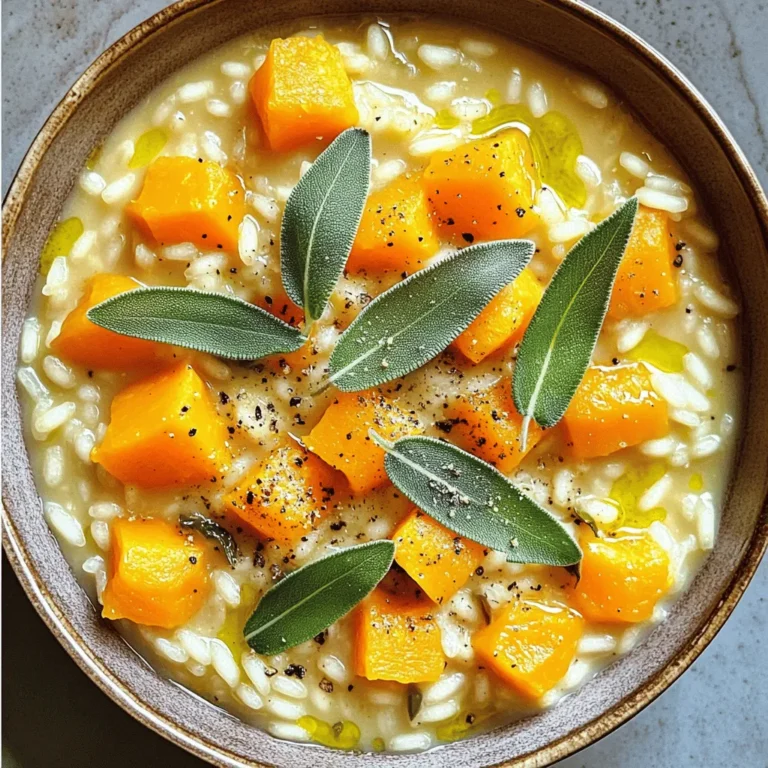Are you ready to dive into a bowl of creamy bliss? My Butternut Squash Risotto with Sage is a tasty and cozy dish perfect for any occasion. This recipe is simple, yet it packs a flavor punch that will impress your taste buds. Follow along as I guide you through the cooking process, offer helpful tips, and explore creative ways to make this dish your own. Let’s get cooking!
Ingredients
List of essential ingredients
To make a flavorful butternut squash risotto, gather these key items:
- 1 medium butternut squash, peeled and diced
- 1 cup arborio rice
- 4 cups vegetable broth
- 1 small onion, finely chopped
- 2 cloves garlic, minced
- 3 tablespoons olive oil
- 1 tablespoon fresh sage, chopped (or 1 teaspoon dried sage)
- 1/2 cup grated Parmesan cheese (optional for serving)
- Salt and pepper to taste
- Freshly cracked black pepper for garnish
Ingredient substitutions
If you need alternatives, here are a few ideas:
- Use pumpkin or sweet potato instead of butternut squash.
- Swap arborio rice for carnaroli rice for a creamier texture.
- Vegetable broth can be replaced with chicken broth for non-vegetarians.
- If fresh sage is unavailable, try thyme or rosemary for a different flavor.
- Omit Parmesan cheese for a dairy-free version, or use nutritional yeast for a cheesy taste.
Optional toppings and garnishes
To make your dish shine, consider these toppings:
- Drizzle with extra virgin olive oil for richness.
- Add toasted pumpkin seeds for crunch.
- Top with fresh sage leaves for color and flavor.
- Sprinkle with additional black pepper or chili flakes for heat.
Step-by-Step Instructions
Preparation of the broth
Start by heating the vegetable broth in a medium saucepan. Bring it to a gentle simmer over low heat. Keeping the broth warm helps the rice cook evenly. You will add this broth little by little later.
Cooking the vegetables
In a large skillet, pour in the olive oil and warm it over medium heat. Add the finely chopped onion and cook for about 3-4 minutes. You want the onion to become soft and clear. Next, toss in the minced garlic and diced butternut squash. Stir and let them cook for 5-7 minutes. The squash should start to soften, making it ready for the next step.
Making the risotto
Now, it’s time to add the arborio rice to the skillet. Stir the rice well to coat it in the oil. Toast the rice for about 2 minutes. This adds a nice flavor. Gradually, ladle in about 1 cup of the warm vegetable broth. Stir often and let the rice soak up the broth before adding more. Keep repeating this for about 20-25 minutes. The goal is creamy rice that is tender but still has a little bite. Once the rice is ready, mix in the chopped sage and season with salt and pepper. Cook for another 2-3 minutes. If you like, stir in some grated Parmesan cheese for extra creaminess. Let the risotto rest for a minute before serving. For the final touch, serve it in shallow bowls, drizzle with olive oil, and sprinkle with black pepper.
Tips & Tricks
How to achieve the perfect creamy texture
To get that rich and creamy texture, use arborio rice. This rice has high starch, which helps the risotto become soft and smooth. Stir often as you cook. This movement releases starch, giving your dish a creamy feel. Always add warm broth gradually. If you dump it all in at once, the rice won’t cook evenly.
Timing your cooking steps effectively
Timing is key in making risotto. Start by cooking the onions and garlic until soft. This step adds flavor. After you add the butternut squash, let it cook for a bit. You want it to soften before adding the rice. When you add the rice, toast it slightly. This step helps enhance the flavor. Keep stirring and adding broth until the rice is just cooked.
Recommended tools and equipment
Using the right tools makes cooking easier. You need a large skillet to sauté the vegetables and rice. A wooden spoon works best for stirring. This spoon helps scrape the bottom and mix well. A ladle is great for adding broth slowly. Plus, have a medium saucepan for warming the broth. These tools make your cooking process smooth and fun.Enjoy your cooking!

Variations
Adding proteins (e.g. chicken, shrimp)
You can easily add protein to your butternut squash risotto. Chicken or shrimp works well. For chicken, cook diced pieces in the skillet before adding onion. For shrimp, add them with the broth. They will cook fast and add a nice flavor.
Alternative grains or sauces
If you want to mix it up, try different grains. Quinoa or farro can replace arborio rice. These grains give unique textures. For sauces, consider a light cream or a splash of white wine. This adds depth to the dish.
Seasonal variations with different vegetables
You can change the vegetables based on the season. For spring, use asparagus or peas. In summer, add zucchini or bell peppers. In fall, try mushrooms or kale. Each veggie brings new flavors and colors to your risotto.
Storage Info
How to store leftover risotto
Store leftover risotto in an airtight container. Let it cool first, then seal it. Keep it in the fridge for up to three days. This helps maintain flavor and texture.
Reheating techniques for optimal texture
To reheat risotto, use a skillet or saucepan. Add a splash of broth or water. Heat on medium-low, stirring often. This keeps it creamy. Avoid microwaving, as it can make it dry.
Freezing tips and recommendations
You can freeze risotto, but it may change texture. Place it in a freezer-safe container. Leave some space for expansion. It lasts up to three months. To thaw, transfer it to the fridge overnight. Reheat as mentioned above for best results.
FAQs
Can I make Butternut Squash Risotto with Sage ahead of time?
Yes, you can make butternut squash risotto ahead of time. I find it best to cook it and then store it in the fridge. Keep it in an airtight container. When you are ready to serve, reheat the risotto gently. Add a splash of broth or water to help restore the creamy texture. This method works well and saves you time.
What can I serve with butternut squash risotto?
You can serve butternut squash risotto with many tasty options. Some great choices include:
- Grilled chicken or turkey
- Roasted vegetables
- A fresh green salad
- Garlic bread
- Sauteed greens, like spinach or kale
These sides add balance and make the meal more filling. I love pairing the risotto with a crisp salad for a refreshing contrast.
How do I make risotto vegan?
To make risotto vegan, you can follow these simple steps:
- Use vegetable broth instead of chicken broth.
- Omit the Parmesan cheese or replace it with a vegan cheese alternative.
- Add extra nutritional yeast for a cheesy flavor without dairy.
- Consider adding plant-based protein like chickpeas or lentils for added nutrition.
These changes keep your dish creamy and delicious while aligning with a vegan diet. Experiment with different herbs and spices to enhance flavor.
This blog post covered essential ingredients and how to prepare a tasty risotto. You learned about substitutions and possible toppings to customize your dish. I shared step-by-step instructions for making the perfect broth and risotto. Remember the tips for that creamy texture and efficient timing. You can explore variations with proteins, grains, and seasonal veggies. For leftovers, proper storage and reheating techniques are key. Enjoy your cooking and make this dish your own!


